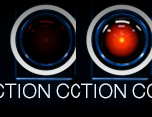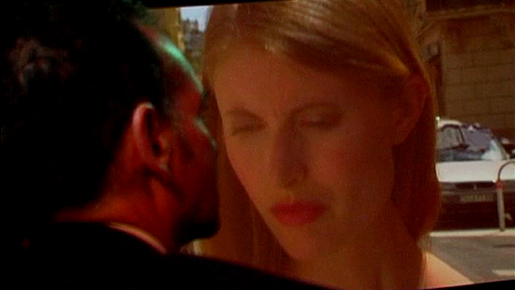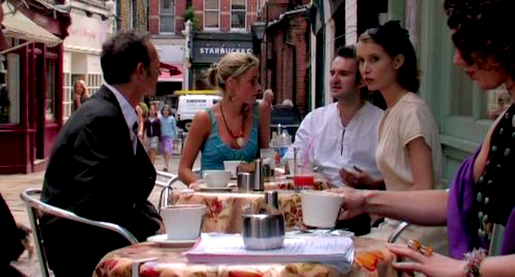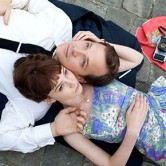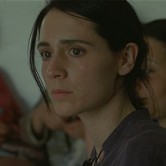Movie Review: HARDLY BEAR TO LOOK AT YOU (2009)
![]()
Here’s Looking at You, Kid.
At first sight, the couple walking and dining throughout Paris appear to be lovers. We are mistaken. Daniel, a trim and fortyish intellectual with a voice like Patrick Bauchau (The Rapture, 1991), is played by Jeremy Herman, the writer of Hardly Bear to Look at You (2009). Stella is a pretty performance artist in her early twenties, played by Anna Neil. A few years ago, Neil starred in a short film called The Yacht (2006), which was written and co-directed by Herman. The other director who also starred in The Yacht was Huck Melnick, who directed his first feature-length film, Hardly Bear to Look at You.
If you are enjoying the giddy sensation of your brain spinning, keep reading.
Daniel, an artist as well a connoisseur of fine food and wines, acts as a mentor to Stella. It’s questionable whether Stella realizes she is his muse — Sylvia to Daniel’s Marcello. Wandering the streets of Paris, he takes her out to restaurants and bars. Their relationship is one of flirtation, but never becomes one as intimate as in Guinevere (1999), though the Audrey Wells film took a more lacerating view of such a coupling. Daniel and Stella sleep in the same bed without sleeping with each other. Upon the description of this May-August romance, Daniel is surprisingly more sympathetic because Stella is never a victim and clearly has the upper hand here. Any advance made by him is either encouraged or vetoed. Director Melnick makes no judgment calls here, but I wish that Daniel had been scorched at least once. His feelings toward her are genuine, so why not challenge him?
He is utterly infatuated with her. The first two minutes of the film simply watches Stella sleeping in the morning light. Great concentration is made to the movement of her feathery collar as she inhales and exhales. Somehow, this does not feel perverse; it is a form of adoration in the sweetest sense. Known to savor the strong tartness of an olive, Daniel commits a silent declaration when he slides an olive into his pants pocket. More obvious is the shot of his jean-clad crotch after he has asked (read: directs) Stella to climb up three flights of stairs to ask her something. He admits to her that he has had sex with a number of women, including prostitutes. Stella claims to having had just a few lovers, but we suspect otherwise, considering how flirtatious and often she runs into other men she knew way back when. Sometimes she is cruel while feigning tactfulness. Being too close to Daniel’s perspective, his jealousy is infectious.
The subtext of sex and longing is sprinkled into their conversations. When playing with the word “genuflect”, Daniel suggests that it means going down on your knees. When he says that, is it merely as a form of prayer or is the suggestion of oral sex (on his part — meaning he wants to do the performing on her)? In a way, oral sex is a form of prayer in of itself. Pray or Prey? One waits while one waits for the other. It’s hard to say which body part of Stella’s in particular Daniel would worship. Perhaps like Marvell, Daniel would spend a hundred years on the eyes. Following the wistful proposition in To his Coy Mistress, it is a pity that living two hundred years is impossible. They play with words. Eventually, the “gen” of “Genuflect” turns to the French translation of Eric Rohmer’s Claire’s Knee (1970), Le Genou de Claire. That tangent of film recommendation was by Daniel, of course.
Back in London, Daniel confides in his male collaborators including Leon (Alex Claus) and Hank (Huck Melnick, who wears garish pink hats throughout). Like all friends who give advice on romance, they encourage him at first and then change their tune to “plenty of fish” after a week or two of inaction. Many times Daniel is told the obvious: giving your heart completely to a twenty-three-year-old is foolish. At one point during a round of Daniel’s rumination, a superimposition of him searching his irritated eye for a contact lenses is enlarged and examined in excruciating detail. Walking under a tunnel one night, Daniel finds the gumption to tell Stella about how amazing the universe is to have created her: “You literally make me see the world differently.” Her response to this isn’t encouraging. In a moment of weakness, while Daniel is walking a close friend and her child through a park, she sees his need, gives him a kiss, then a hug, and bids him good-bye. Looking into his eyes watching the mother and child go off, we remember that the path not taken always stings. Perhaps Daniel should meet up with Tom (Joseph Gordon-Levitt) from Marc Webb’s (500) Days of Summer and exchange horror stories over coffee, but I don’t think Tom would go for it.
What makes Herman’s work so engrossing is his sincerity and honesty. There’s little doubt that this story comes from personal experience. His heart is wandering, searching for answers and he doesn’t care how vulnerable that makes him look on screen and in our minds. Herman and Neil make their characters credible by being free of vanity and making their rapport feel natural. The characters are so smart and witty that I wished their conversations were extended like My Dinner with Andre (1981). Sometimes it’s like a falling under a warm spell. The best scene is when they ponder about the difference between “room temperature” and “body temperature” over red wine and pheasant. Just as the record playing Mozart’s Church Sonata no. 8 ends, the subject switches to work. It’s no accident that when Daniel’s heart breaks, Stella moves her head aside and we see a large microphone on the top-right corner of the screen.
Melnick is greatly influenced here by the Dogma Movement, a manifesto founded by Lars von Trier and Thomas Vinterberg in the mid-1990s to achieve what they considered to be “pure cinema”. They insisted on rules such as filming with hand-held cameras only on location using only sound at the time of shooting. Forget about using filters! Within the confines of this style, the thin-skinned presentation is at best authentic and at worst unpolished. It doesn’t mesh well with my tastes. I consider the works of Michael Powell, François Truffaut, Patrice Leconte and Alfred Hitchcock, to name a few, as pure cinema. Though I prefer current independent films to be presented with more lustre and care like the ones by David Gordon Green (George Washington, 2000) and Lynne Ramsay (Ratcatcher, 1999). Digital camcorders are a godsend for talented filmmakers who want to realize their visions outside of a studio. How good the final result is depends on treating camera less like a cocktail shaker. So far, Agnès Varda’s The Beaches of Agnès is the best shot film this year that uses digital camcorders.
However, Hardly Bear to Look at You comes fairly close to the best example of Dogma Movies (and also its first) set by the Danish film The Celebration (1998), a dark comedy of manners directed by Thomas Vinterberg. That film used its obstructions to discover exciting liberations in film language. There are quite a few times when Melnick does exactly that. There is a momentous shot that takes us from looking out a window over a snowy Parisian cityscape over to Daniel and Stella sitting in bed that is so quick that it’s like we’re peeling back the still frames like the pages of a book. Thankfully, we are safely distanced from the pretentious excesses of Harmonie Korine — I haven’t seen Mister Lonely (2007) yet, and I hope to like a Harmonie Korine film one day.
What I admire most is how upfront Melnick is with his jittery digital camera, bare production work and abrupt edits. Differing hues in a succession of shots hold continuity in contempt. Occasional spurts of half-heard conversations propel us to more substantial scenes. Sometimes the abruptness of the edits works and sometimes they are distracting. You can either handle it or not. There is no middle ground. It may skirt a little close to gimmickry, but Melnick should be commended as a calculating risk-taker. This is deliberate considering how much more graceful Melnick’s camera is in his short The Yacht. Most importantly, a purpose is behind this style. Like Herman’s story, there are no illusions of hipness and irony. Hardly Bear to Look at You is reminiscent of the work by Richard Linklater (Before Sunrise, 1994) and Jean-Luc Goddard (Pierrot Le Fou, 1965).
It isn’t safe to assume how close both Herman and Neil really are to Daniel and Stella’s relationship. How close are these alter egos to the performers off-screen? There is no doubt that their professional relationship is genuinely depicted here. The devices of Dogma are used to peer into the thirsty heart of an artist who earnestly believes that Stella (or Neil?) is his last chance at true love. To cope with his heartbreak, Daniel employs his art to tell this story. The reflections of the artist and the medium constantly remind us that we are watching a movie. Not in the sense that the artifice of the film is transparent, but that it exists as a film in a film. You can almost sense the celluloid racing through the projector is slowly peeling back to examine its backside.
We can always hear overlays of dialogue being inserted in shots, which is forgivable here, but a few times the use of natural location sound makes it difficult to hear what the characters are saying. For instance, the last few words of advice by Leon as he walks down the street are drowned out by traffic. One scene set in a real restaurant with a loud crowd, I found myself straining to hear Daniel and Stella’s dialogue. That’s too bad because it might have been interesting. I wished that Melnick had cheated those few times by committing a Dogma-No-No: dubbing their voices and controlling background noise. It’s amazing how naturalistic Ramin Bahrani (Chop Shop, 2008 and Goodbye Solo, 2009) makes his environments sound, yet he attains it by labouring in a sound studio.
Hardly Bear to Look at You is as playful as its title. It could have followed after “I Can”, but that personified directive is too afraid to peek outside. A smash cut from Daniel’s bereaved face to a yellow lemon growing outside is a coy simile met by sourness. Shots preparing the shoot of My Yacht (2006) at the Cannes Film Festival are cleverly integrated in the film. They showcase Stella in the role of Laura who dances on a large motorized petal dressed as a ballerina doll with a large, spinning key attached to her back. It takes Daniel some time to realize how this casting has ultimately imagined his object of desire into something as crude and lifeless as a toy. Stella claims that Audrey Hepburn is her role model, but she could have easily had said it was Mariel Hemingway. Perhaps Melnick and Herman felt that the game would have been given away too quick if either Daniel or Stella had cited Manhattan (1979). After all, Woody Allen has been playing in their backyard for the past few years.
Because the story resists a conventional conclusion and flirts with being a little open ended, we remain more invested than in most romantic comedies. The script is not on autopilot. The characters are so odd and liberated that anything could happen. While watching, the relationship seems doomed, but these people are a strange and funny lot. If Stella has no plans to make with Daniel, why is she still hanging around him? Daniel’s devastation possesses the spirit of Timothy Spall’s line of dialogue in Mike Leigh’s All or Nothing (2002): “I feel like a tree that’s got no water!” In one shot late at night, we linger on another man and woman making out against a building as Stella and Daniel walk right by. Over the last few minutes, when the film circles around itself in a whirling blend of its narrative and medium, ask yourself who is ultimately at the controls. If it’s not Melnick inside, is it Daniel? Stella? Both? More? Or is it just us?
You can watch The Yacht (29 mins.) here.
“Hardly Bear to Look at You” Trailer
Note: The watercolour paintings in Daniel’s apartment are by Tony Rothon.
© 2008 – 2024, CINELATION | Movie Reviews by Chris Beaubien. All rights reserved.


